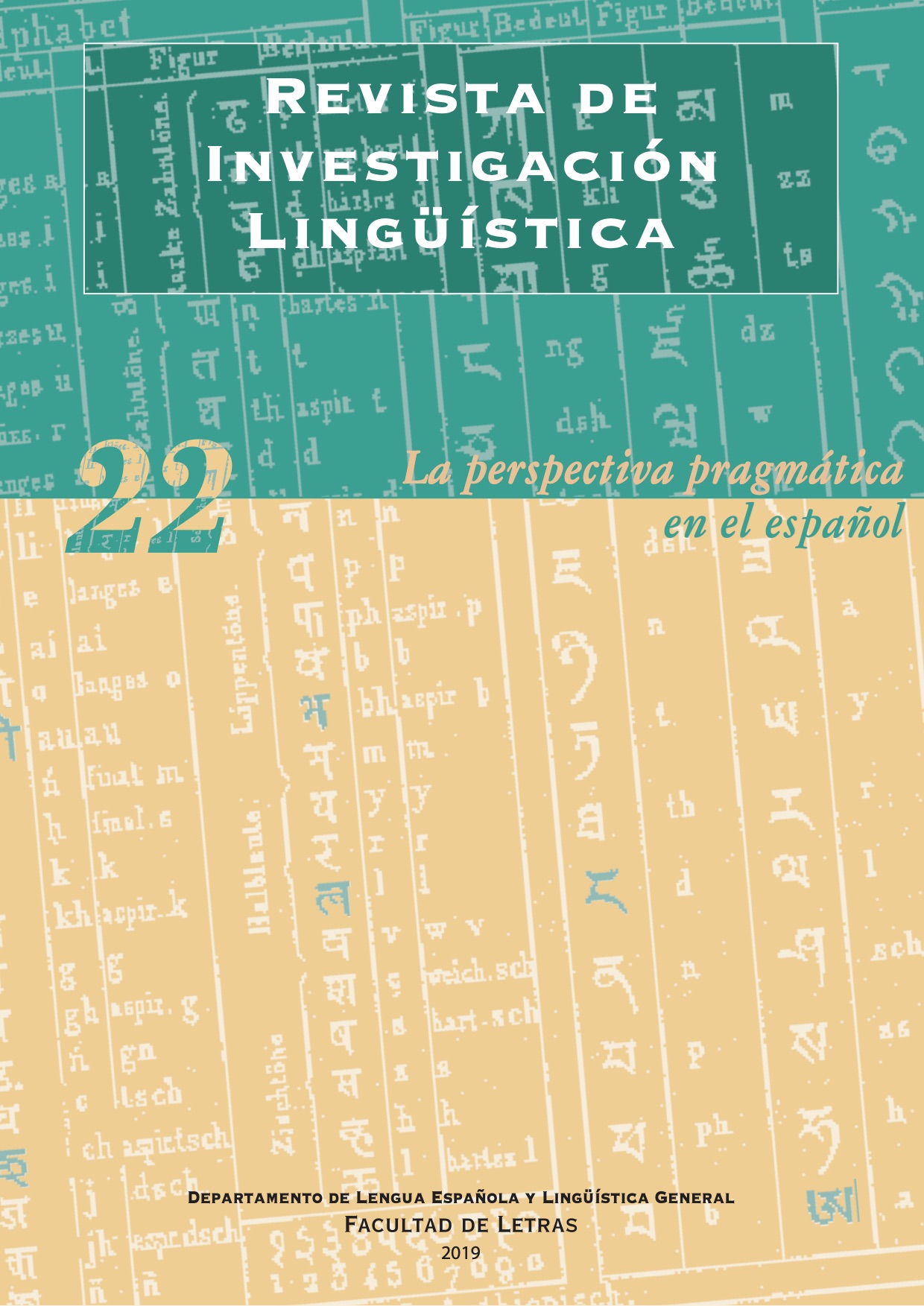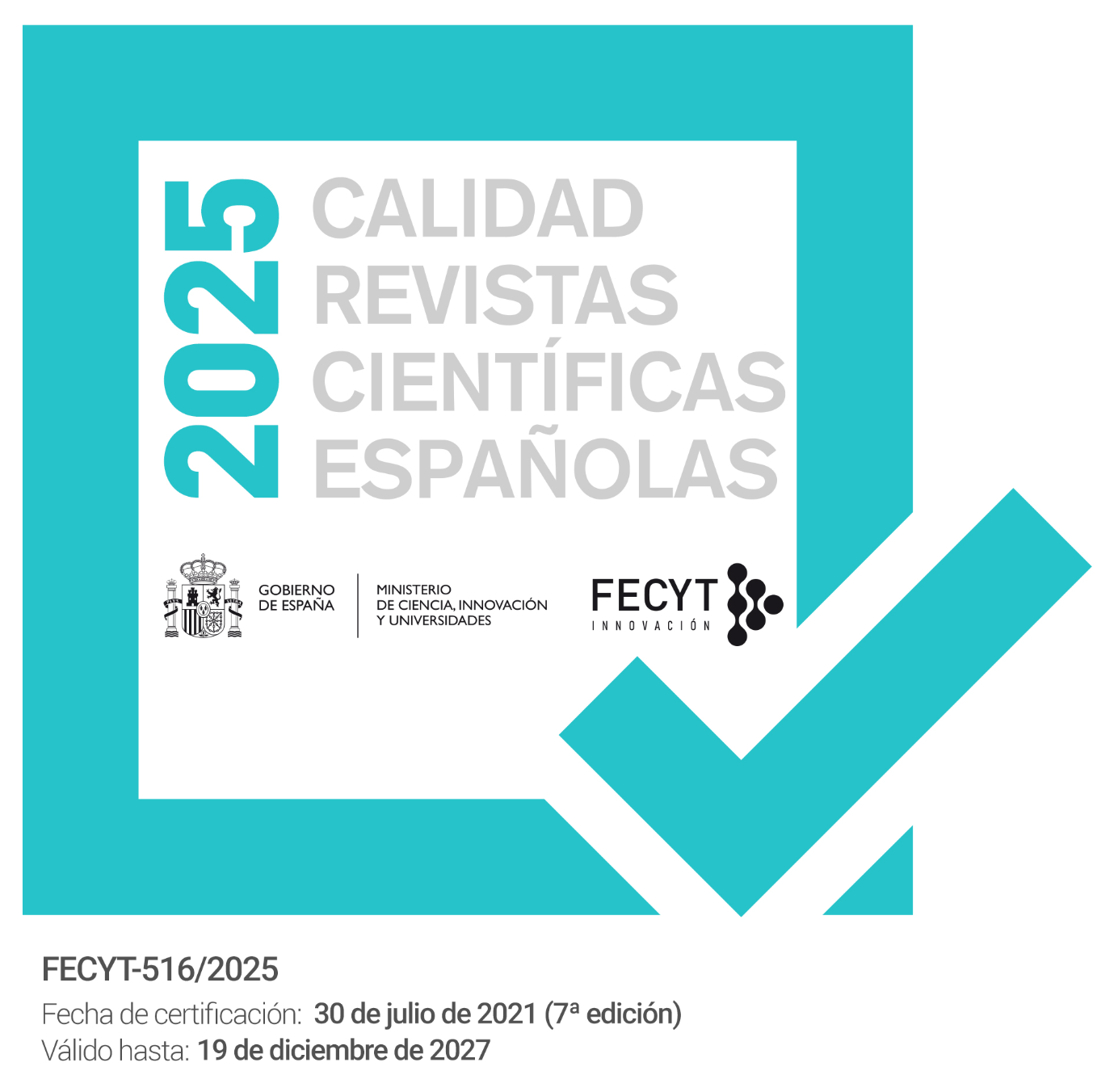Sociolinguistic factors of the subject expression in the high sociolect of PRESEEA-Seville corpus
Supporting Agencies
- Patrones Sociolingüísticos del Español de Sevilla (Ref. FFI2015-68171-C5-3-P),
Abstract
This study aims to analysis the variable presence/absence of the personal pronoun subject with a conjugated verb in Spanish language spoken in the city of Seville. Specifically, we try to stablish which internal or external factors are involved in the pronominal subject use in a sample of 24 semi-controlled interviews corresponding to the high sociolect and taken from the PRESEEA-Seville corpus. For this, we base our analysis on the coding guidelines proposed by Bentivoglio, Ortiz and Silva-Corvalán (2011) for the PRESEEA panhispanic project. The results show that the subject pronoun is used in 24,8% and it is conditioned by different criteria, such as grammatical person, specificity, ambiguity of the verbal form, semantic class of the verb, co-reference or age.
Downloads
-
Abstract1031
-
PDF (Español (España))688
References
Aijón Oliva, Miguel Ángel y María José Serrano (2010): «El hablante y su discurso: expresión y omisión del sujeto de creo», Oralia, 13, pp. 7-38.
Alfaraz, Gabriela G. (2015): “Variation of Overt and Null Subjects Pronouns in the Spanish of Santo Domingo”, en Ana M. Carvalho, Rafael Orozco y Naomi Lapidus Shin (eds.), Subject Pronoun Expression in Spanish: A Cross-dialectal perspective, Washington DC, Georgetown University Press, pp. 3-16.
Alvar, Manuel (1955): «Las hablas meridionales de España y su interés para la lingüística comparada», Revista de Filología Española, 39/10-40, pp. 284-313.
Barrenechea, Ana María y Alicia Alonso (1977): «Los pronombres personales sujetos en el español hablado en Buenos Aires», en Juan M. Lope Blanch (ed.), Estudios sobre el español hablado en las principales ciudades de América, México, UNAM, pp. 333-349.
Bentivoglio, Paola (1980): Why canto and not yo canto? The problem of first-per- son subject pronoun in spoken Venezuelan Spanish. M. A. Thesis, Los Angeles, University of California.
Bentivoglio, Paola (1987): Los sujetos pronominales de primera persona en el habla de Caracas. Caracas, Universidad Central de Venezuela.
Bentivoglio, Paola, Luis A. Ortiz y Carmen Silva-Corvalán (2011): La variable expresión del sujeto pronominal. Guía de codificación. Disponible en http://preseea.linguas.net/Portals/0/Metodologia/guia_codificacion_sujetos_julio_2011.pdf. [18/06/19]
Cameron, Richard (1993): «Ambiguous agreement, functional compensation, and non-specific tú in the Spanish of San Juan, Puerto Rico and Madrid, Spain», Language Variation and Change, 5, pp. 305-334.
Cameron, Richard (1996): «A community-based test of a linguistic hypothesis», Language in Society, 25/1, pp. 61-111.
Carvalho, Ana, Rafael Orozco y Naomi Shin (2015): Subject Pronoun Expression in Spanish: A cross-dialectal perspective, Washington DC, Georgetown University Press.
Davidson, Brad (1996): «‘Pragmatic weight’ and Spanish subject pronouns: The pragmatic and discourse uses of tú and yo in spoken Madrid Spanish», Journal of Pragmatics 26, pp. 543-565.
Enríquez, Emilia V. (1984): El pronombre personal sujeto en la lengua hablada en Madrid, Madrid, Consejo Superior de Investigaciones Científicas.
Erker, Daniel y Gregory R. Guy (2012): «The role of lexical frequency in syntactic variability: variable subject personal pronoun expression in Spanish», Language, 88, pp. 526-557.
Fernández Soriano, Olga (1999): «El pronombre personal. Formas y distribuciones. Pronombres átonos y tónicos», en Ignacio Bosque y Violeta Demonte (eds.): Gramática Descriptiva de la Lengua Española, Madrid, Espasa Calpe, pp. 1209-1273.
Guerrero, Silvana (2019): «Expresión del sujeto pronominal en el corpus PRE- SEEA de Santiago de Chile». Ponencia en el Seminario Internacional Las investigaciones lingüísticas en el Mundo Hispánico. Cuba, La Habana, 30 de enero -1 de febrero de 2019.
Hochberg, Judith G. (1986): «Functional compensation for /s/ deletion in Puerto Rican Spanish», Language, 62, pp. 609-621.
Hurtado Cubillos, Luz Marcela (2001): La variable expresión del sujeto en el español de los colombianos y colombo-americanos residentes en el condado Miami-Dade. Tesis doctoral, Universidad de Florida.
Kiparsky, Paul (1982): Explanation in phonology. Dordrecht, Foris.
Luján, Marta (1999): «Expresión y omisión del pronombre personal», en Ignacio Bosque y Violeta Demonte (eds.), Gramática descriptiva de la lengua española, vol. 1, Madrid, Espasa Calpe, pp. 1275-1315.
Lastra, Yolanda y Pedro Martín Butragueño (2015): «Subject Pronoun Expression in Oral Mexican Spanish», en Ana M. Carvalho, Rafael Orozco y Naomi Lapidus Shin (eds.), Subject Pronoun Expression in Spanish: A Cross-dialectal perspective, Washington DC, Georgetown University Press, pp. 39-57.
Majón-Cabeza Cruz, Antonio et al. (2016): «Factores determinantes en la ex- presión del sujeto pronominal en el corpus PRESEEA Granada», Boletín de Filología, 51/2, pp.181-207.
Miró Vera, Ramona y Miguel Ángel de Pineda Pérez (1990): «Determinación sociolingüística de la presencia/ausencia del pronombre personal sujeto», en M.a Teresa Palet (ed.), Sociolingüística andaluza 5. Habla de Sevilla y hablas americanas, Sevilla, Universidad de Sevilla, pp. 37-44.
Miyajima, Atsuko (2000): «Aparición del pronombre sujeto en español y semántica del verbo», Sophia Lingüística, 46-47, pp. 73-88.
Montes Miró, Rosa Graciela (1986): «Los factores discursivos en el análisis de los pronombres personales sujeto en español», Morphé, 2, pp. 45-71.
Orozco, Rafael y Gregory R. Guy (2008): «El uso variable de los pronombres su- jetos: ¿qué pasa en la costa Caribe colombiana?», en Westmoreland, Maurice y Juan Antonio Thomas (eds.), Selected Proceedings of the 4th Workshop on Spanish Sociolinguistics, Somerville, MA, Cascadilla Proceedings Project, pp.70-80.
Orozco, Rafael y Luz Marcela Hurtado Cubillos (2019): «A Sociolinguistic Study of Pronominal Expression in Mainland Colombian Spanish», ICLA- VE 10, International Conference on Language Conference in Europe. Leeuwarden, 26-28 de junio de 2019.
Otheguy, Ricardo y Ana Celia Zentella (2012): Spanish in New York: Language contact, dialectal leveling, and structural continuity, Oxford, Oxford University Press.
Peškova, Andrea (2015): Sujetos pronominales en el español porteño. Implicaciones pragmáticas en la interfaz sintáctico-fonológica, Berlin, De Gruyter Mouton.
Real Academia Española (1973): Esbozo para una nueva gramática de la lengua española, Madrid, Espasa-Calpe.
Real Academia Española y Asociación de Academias de la Lengua Española (2009): Nueva Gramática de la lengua española, Madrid, Espasa.
Ranson, Diana (1991): «Person marking in the wake of /s/ deletion in Andalusian Spanish», Language Variation and Change, 3/2, pp. 133-152.
Repede, Doina (ed.) (2019): El español hablado en Sevilla. Corpus PRESEEA-Sevilla. Vol. I Hablantes de instrucción alta, Sevilla, Editorial Universidad de Se- villa.
Ropero, Miguel (2001): «Sociolingüística andaluza: problemas y perspectivas», en Carbonero, Pedro y Rosario Guillén (eds.), Sociolingüística andaluza, 12. Identidad lingüística y comportamientos discursivos, Sevilla, Secretariado de Pu- blicaciones de la Universidad de Sevilla, pp. 21-48.
Shin, Naomi Lapidus y Ricardo Otheguy (2013): «Social class and gender impacting change in bilingual settings: Spanish subject pronoun use in New York», Language in Society, 42, pp. 429-452.
Silva-Corvalán, Carmen (1982): «Subject expression and placement in spoken Mexican-American Spanish», en Jon Amastae y Lucía Elías-Olivares (eds.), Spanish in the United States, Cambridge (MA), Cambridge University Press, pp. 93-120.
Silva-Corvalán, Carmen (1994): Language Contact and Change. Spanish in Los Angeles, Oxford, Clarendon Press.
Silva-Corvalán, Carmen (1997): «Variación sintáctica en el discurso oral: problemas metodológicos», en Francisco Moreno Fernández (ed.), Trabajos de sociolingüística hispánica, Universidad de Alcalá, Nuevo Siglo, pp. 115-135.
Silva-Corvalán, Carmen (2015): «Infantes bilingües y hablantes de herencia adultos: ¿Qué los vincula?», Boletín de Filología, 50/1, pp. 165-191.
Travis, Catherine (2007): «Genre effects on subject expression in Spanish: Priming in narrative and conversation», Language Variation and Change, 19/2, pp. 101-135.
The works published in this magazine are subject to the following terms:
1. The Publications Service of the University of Murcia (the publisher) preserves the economic rights (copyright) of the published works, and favors and allows the reuse of same under the license of use indicated in point 2.
2. The papers are published in the electronic edition of the magazine under a Creative Commons Attribution-NonCommercial-NoDerivative 3.0 Spain license (legal text). Papers may be copied, used, disseminated, transmitted and publicly exhibited if the following requirements are met: i) The authorship and the original source of its publication (magazine, editorial and URL of the work) must be cited; ii) The works cannot be used for commercial purposes; iii) The existence and specifications of this user license must be explicitly mentioned.
3. Self-archiving conditions. Authors can electronically disseminate pre-print versions (version before being evaluated) and / or post-print versions (version evaluated and accepted for publication). This makes possible its circulation and diffusion earlier and with it a possible increase in its citation and reach among the academic community. RoMEO color: green.










